Hello Forecasters,
Welcome back to the Inflection Point. The newsletter tracking 100 million consumer signals to predict cultural shifts relevant to you.
This week, we're covering the 'COP28 Controversy.'
TLDR;
- Fossil fuel companies are making more money than ever
- Big polluters are pulling back on their climate pledges
- The United Nations has appointed an oil sultan to lead the world’s climate negotiations
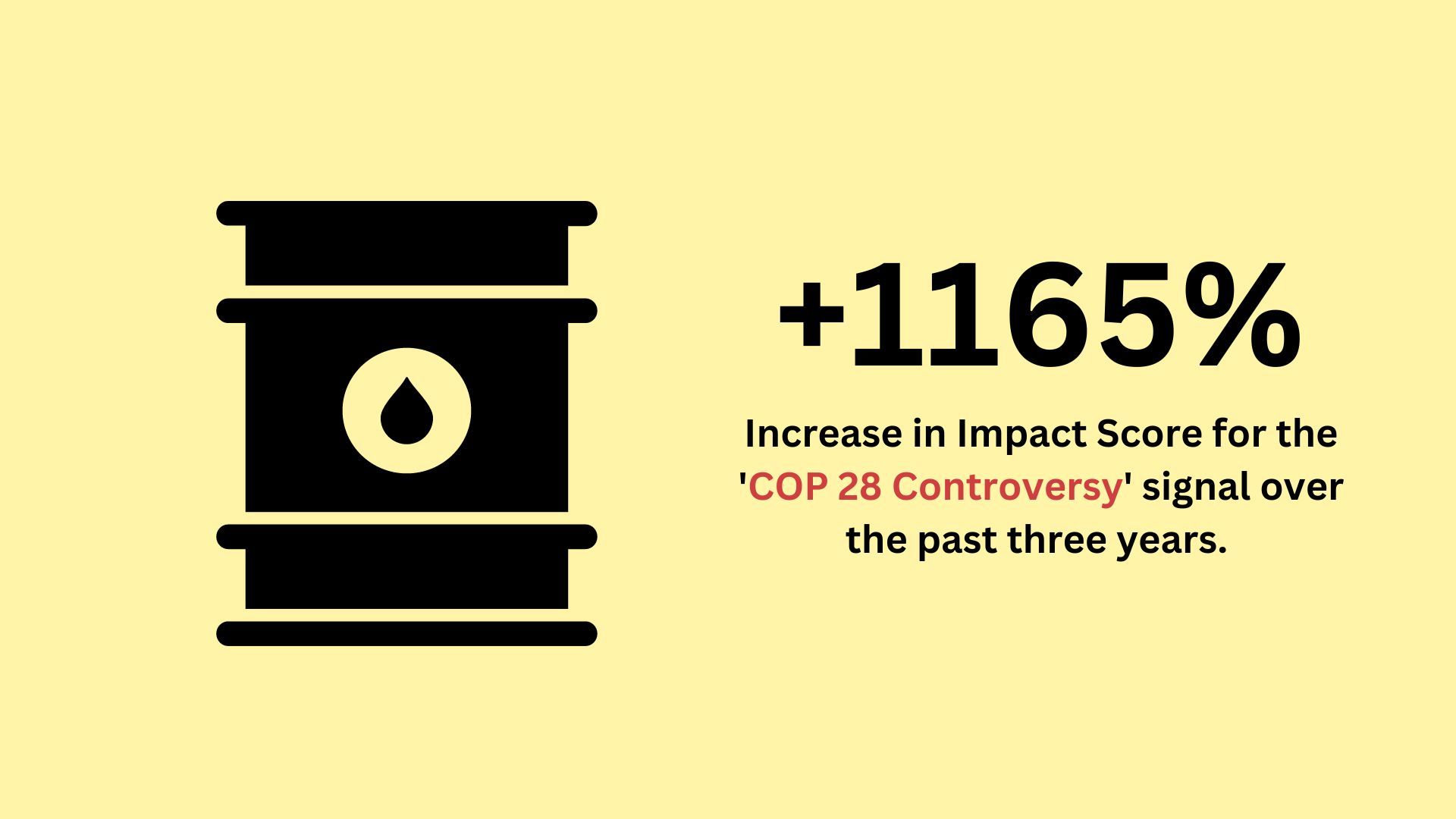
What is COP28?
The ‘Conference of the Parties, more commonly known as ‘COP’, is the United Nations Climate Change Conference, where global leaders are invited to negotiate policies limiting the worst effects of global warming.
Why we chose this topic
A few weeks ago, NWO.ai was alerted to an inflection point for the ‘COP 28 Controversy’ signal.
Our narrative analysis told us that the conversation was driven by social –an outcry of confusion as to why someone who intends to invest $150 billion in fossil fuel production would lead our climate negotiations.
A bit bias, no?
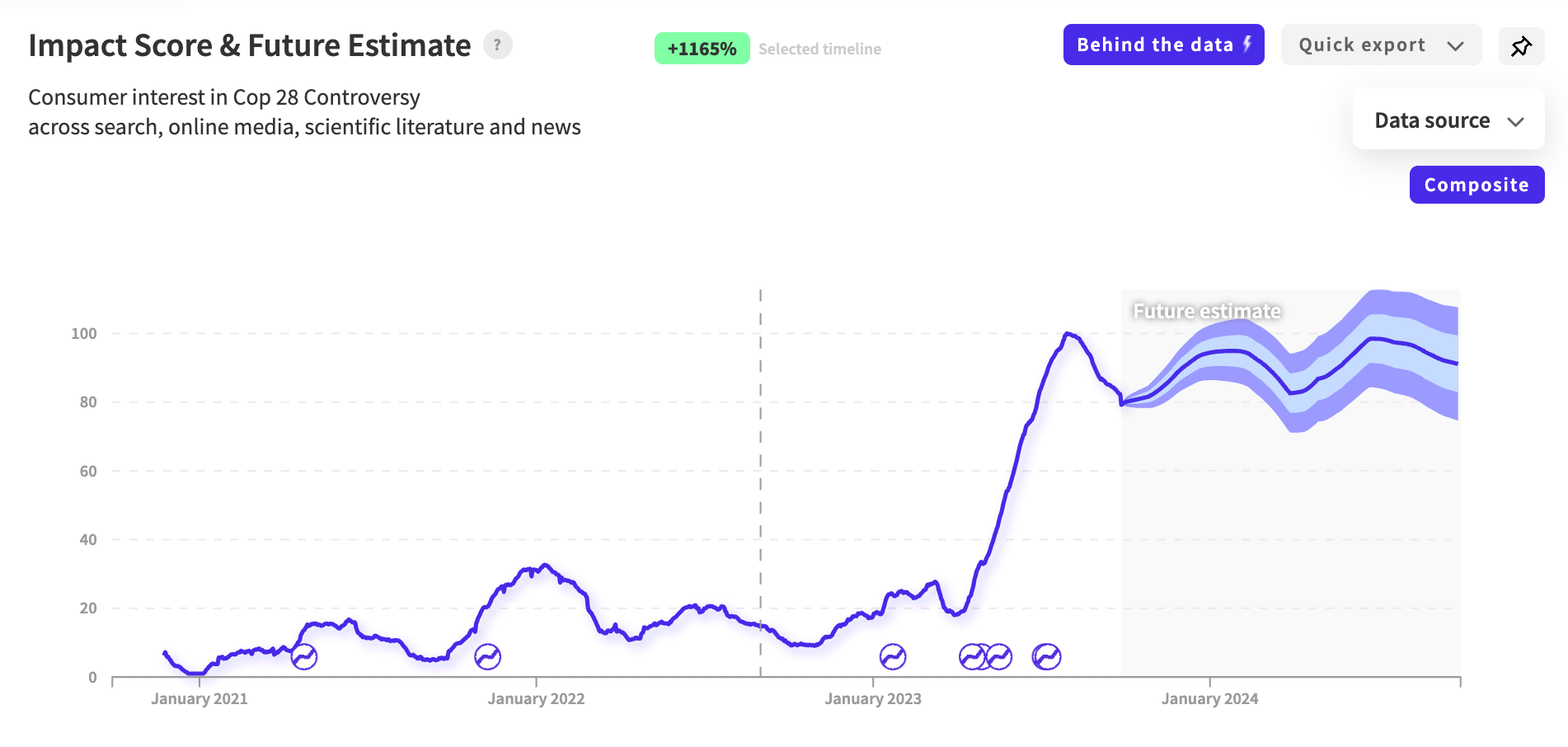
So, how did we get here?
Let’s set the stage.
It’s 2020, and the barrel price of oil has briefly dipped below zero. Oil giants are trying to outdo one another with promises to cut emissions and “get serious” about renewables.
- Shell pledges to go “net zero”
- BP promises to “slash” its emissions
- Exxon is hyped about it’s efforts to transform algae into fuel.
A pandemic means fewer flights and supply chain emissions. Densely air-polluted areas of China start seeing mountaintops again, and supposedly, dolphins are even returning to the canals of Venice.
The world is finally lowering its emissions.
But speed up to 2023, and the scene is very different.
Oil giants have pumped the breaks on their public initiatives to, you guessed it, continue pumping oil
Barrels are back at their $80-$100 range.
How did this happen?
Like so many shifts throughout humanity, war is to blame
The below NWO.ai signal comparison report shows that when Russia invaded Ukraine in February 2022, there was a drastic narrative shift from minimizing emissions to ensuring affordable, secure energy.
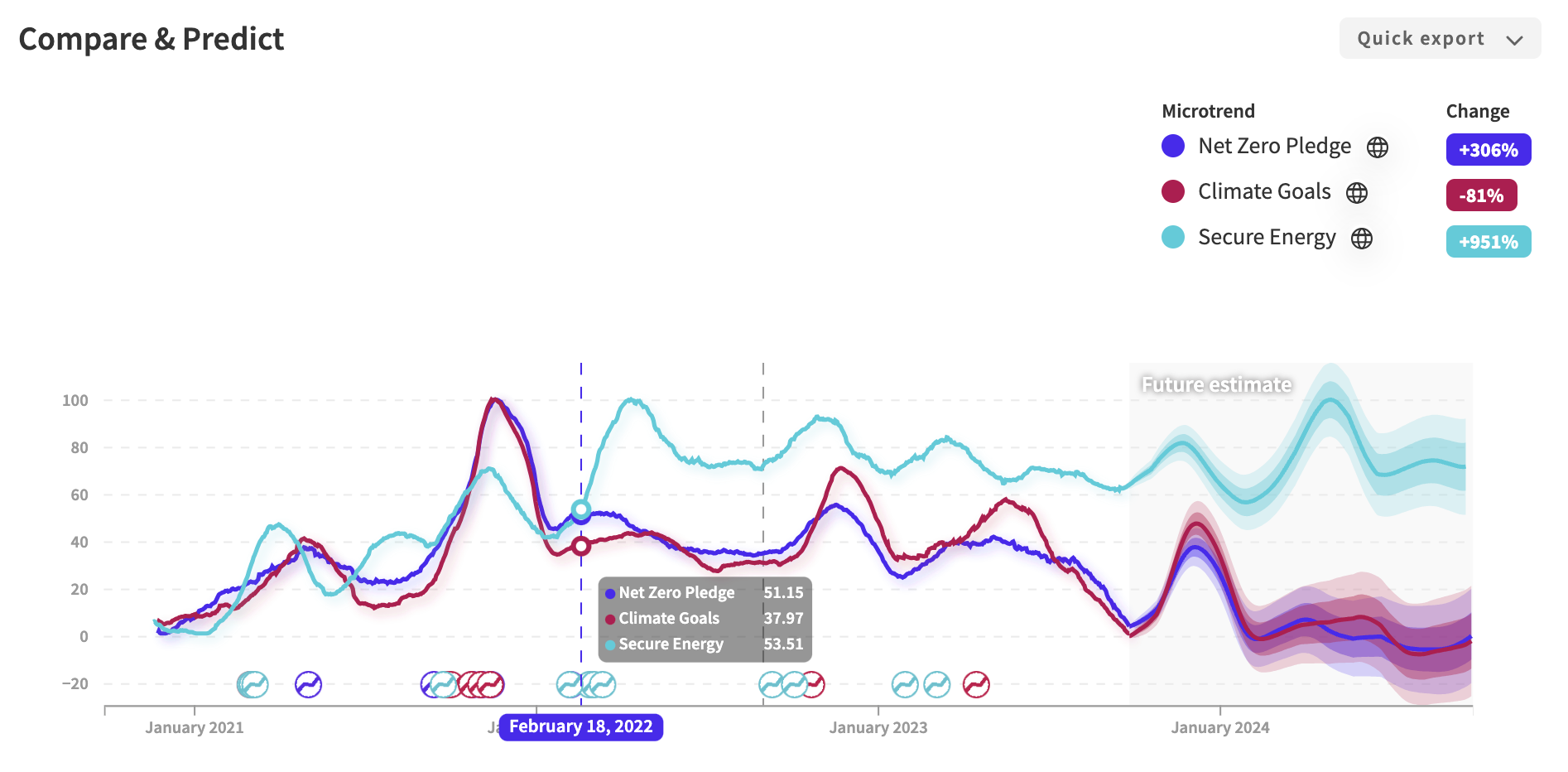
The war meant that the US and EU wanted to end Russian gas and oil imports – this allowed Exxon and other companies to ramp up oil production in the name of “secure energy.”
In a Wall Street Journal interview, Bernard Looney, the CEO of BP, said,
“We must not just deliver cleaner energy, we must also deliver affordable energy, secure energy.”
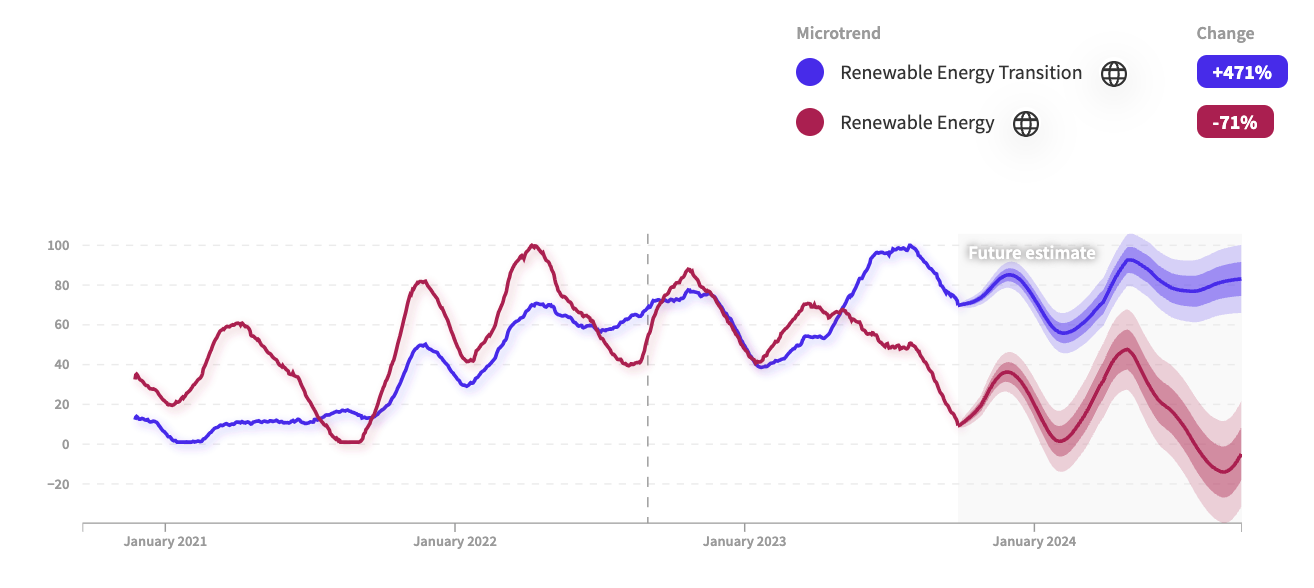
The above NWO.ai comparison report shows the narrative shift from ‘renewable energy’ to ‘renewable energy transition’ – echoing the changing attitude around the continued use of cheap, ‘secure’ energy.
Political will is back on fossil fuels’ side
- In its quarterly earning report, BP said it made $27.7 billion in 2022, more than double its 2021 profits.
- Shell posted a $41.6 billion profit last year, more than $10 billion higher than its previous record.
- Exxon and Chevron announced their highest profits ever, with $55.7 billion and $36.5 billion, respectively.
Despite soaring profits:
- BP walked away from its target to reduce emissions by 35 percent in 2030 – once regarded as the most ambitious goal in the industry.
- Shell silently abandoned it’s $100 million sustainability plan, which would have accounted for 10% of it’s emissions.
- Meanwhile, Exxon has withdrawn funding from its decades-long algae fuel effort.
The NWO.ai consumer sentiment analysis reveals deep corporate denial, a conversation primarily had on social media, where oil giants have spent millions on greenwashing influencers across TikTok and IG targeting Gen Z.
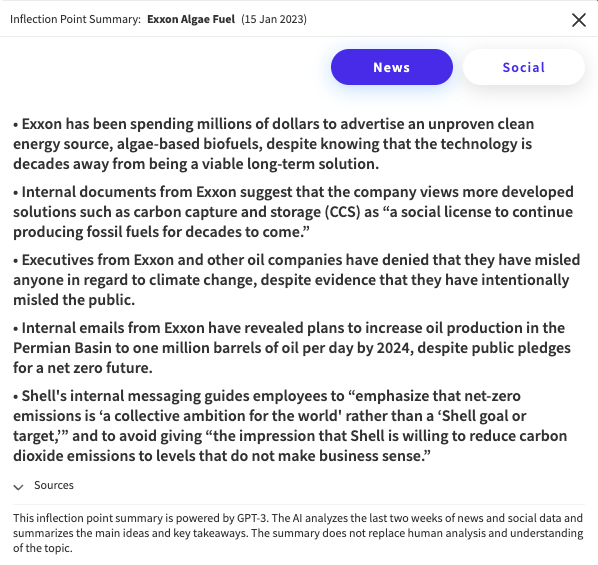
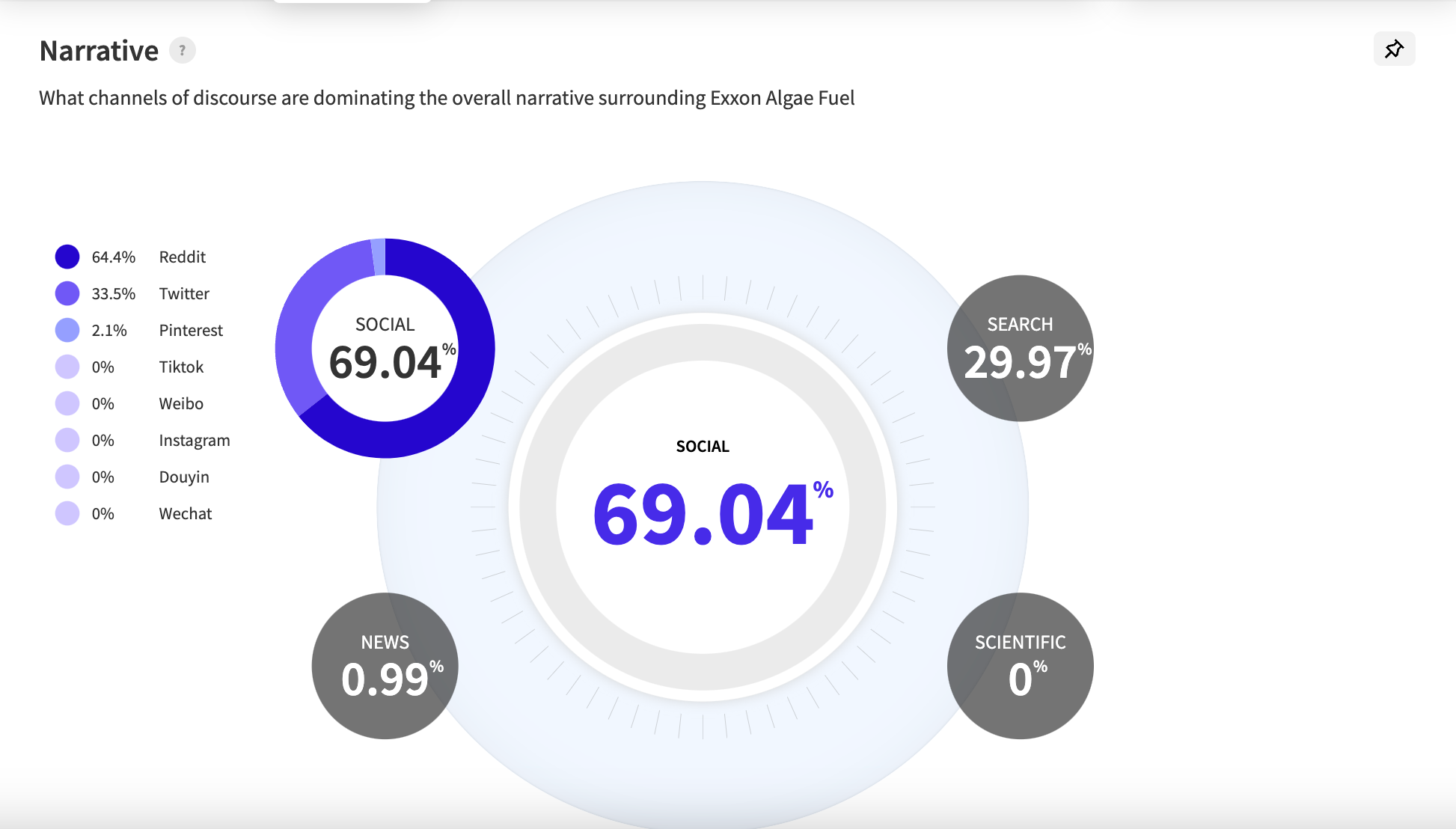
Big Oil isn’t the only industry withdrawing its climate promises
In 2019, Amazon announced its “Shipment Zero” campaign, a pledge to end shipment emissions by 2030. A few weeks ago, their spokesperson said it “no longer makes sense” to have a climate goal separate from the rest of their emissions. Amazon is now pushing back its entire climate pledge by a decade.
Delta, JetBlue, and EasyJet, who accounted for nearly 15% of carbon credit purchases since 2020, have all reduced their purchases this past year. Delta’s in-flight napkins that previously claimed it was a “carbon-neutral airline” has even prompted a class-action lawsuit for false claims.
This week, Bloomberg highlighted that BlackRock closed down two of its ESG funds, stating that more ESG funds closed this year than in the previous three years.
And now we have COP28 in Dubai
Dubai is one of the seven emirates of the United Arab Emirates – a region that has witnessed extraordinary transformation since the discovery of oil in the late 1960s.
The once-sleepy fishing village has rapidly grown into a city synonymous with opulence, innovation, and economic prowess, primarily fueled by oil exports.
Given the direct scientific connection between burning fossil fuels and human-induced climate change, it feels ironic that a conference aiming to minimize climate change would choose such a destination.
It's almost as ironic as COP27 being sponsored by Coca-Cola, the world’s largest plastic bottle pollutor.
The president of the UN climate summit is in charge of leading negotiations that will limit the worst effects of global warming
We have a total scientific consensus that burning fossil fuels drives global warming, so why are we allowing a man who intends to allocate billions to do just that, lead our international climate conference?
Here's the nuance.
Sultan Al Jabar founded the renewable energy company Masdar, which has invested billions in renewable energy tech, including wind and solar, in over 40 countries.
He simultaneously directs Adnoc, a national oil company that pumps millions of barrels daily and aims to spend $150 billion to ramp up output in the next five years. This growth is estimated to contribute 2.2 gigatons of CO2, more than a year of emissions from Japan and Germany combined.
Al Jabar says he has spoken with academics, financiers, indigenous elders, and fellow oil executes and has concluded that past negotiations have failed because the fossil fuel industry has yet to have a seat at the table.
It’s worth noting that 636 fossil fuel lobbyists were registered at COP27.
133 US and European lawmakers signed a letter calling for him to be replaced
Multinational fossil fuel companies have a well-documented track record of countering climate science through misinformation and lobbying campaigns, even now as public internal documents have revealed they were well aware of the effects of their products on the atmosphere.
In addition to the ‘secure energy’ narrative, three other reframes are positioning the continued growth of the fossil fuel industry.
- Climate Reparations
- Direct Air Capture Technology
- Economic Security for Developing Nations
At last year's climate negotiations, Saudi Arabia, Russia, China, and other fossil fuel nations blocked language in the final resolution that would have set a timeline for fossil fuel phaseout.
What was regarded as an achievement was a monetary fund to aid countries most at risk for climate catastrophe.
Rather than addressing the root cause of global warming, countries would rather throw money at the issue
This also takes the form of carbon capture technology. While revolutionary, this tech will not be able to scale at the same rate as intended oil production– not to mention the energy required to build and run these systems in the first place.
Electric Vehicles are also a clever way for fossil fuels companies to invest in “solutions” – most EVs on the road in the U.S. today are plugging into charging stations running gas and oil-fueled central grids.
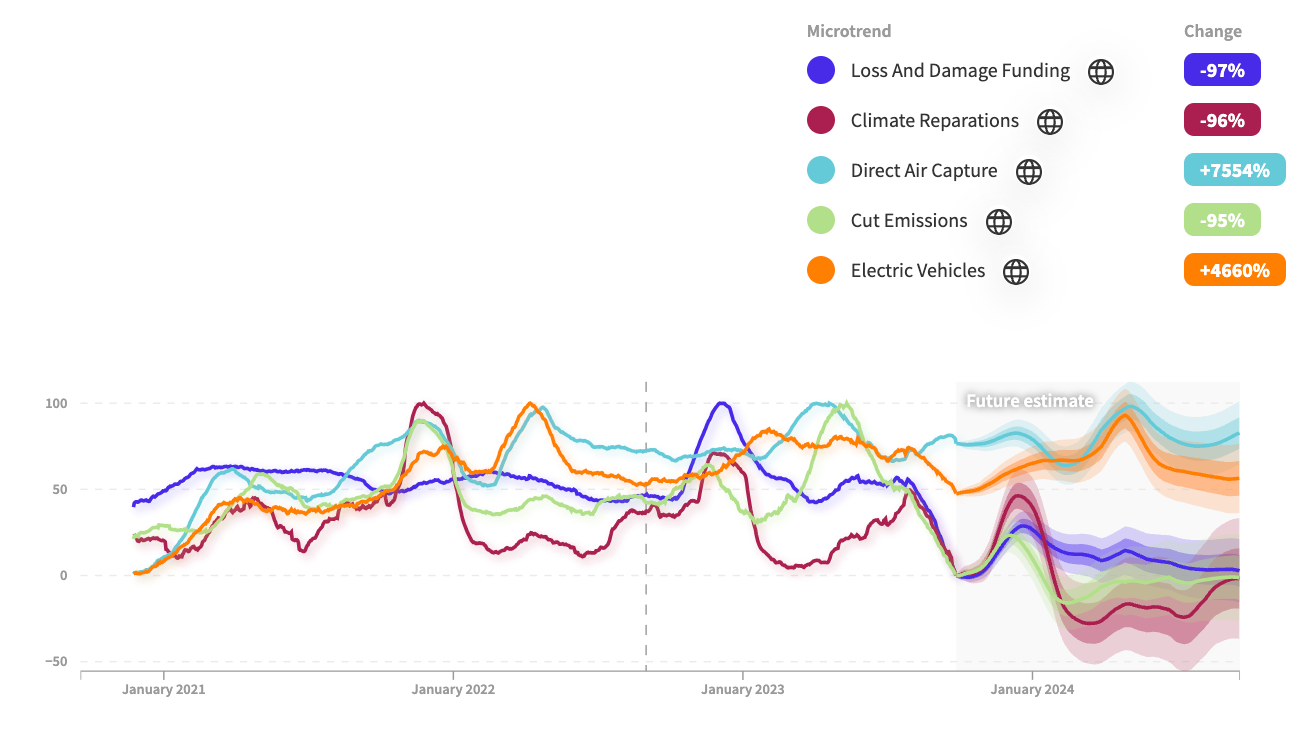
And then there's modernization
Masdar, Al Jaber’s renewable energy company, has made significant investments in the development of Uzbekistan.
“We need everything we can get,” Jurabek Mirzamakhmudov, the country’s energy minister, told the New York Times last week.
“We want whatever can be done the quickest and the cheapest.”
Oil companies like Advoc are praised for providing “economic security” for nations
Can we blame them?
Developing countries simply want the energy stability that the US and other leading nations have had for decades. Uzbekistan saw an 18% increase in gas energy use last year.
“As long as the market demands it”
And we do.
Simply put, our world is addicted to fossil fuels.
That's why there is such a significant controversy surrounding this year's upcoming COP. Al Jaber is hedging his bets with one hand in oil and gas and renewables in the other. While it may be smart business, especially since renewables face inflation and raw material supply chain issues, should it be the bias our COP president finds themselves in?
“We don’t want to disrupt the world. And yet neither do we want business as usual” – Sultan Al Jaber
Fossil fuel companies aren’t just getting a seat at the table at this year's COP; they’re setting it.
While many will be eager participants of COP28, we at the NWO.ai team prioritize genuine productivity and data-driven insights over mere appearances.
As we see continued distrust in government entities, private businesses are now being looked to as drivers of truth and progress.
We’ll continue monitoring the ongoing conversation, but that’s all we’ve got for now.